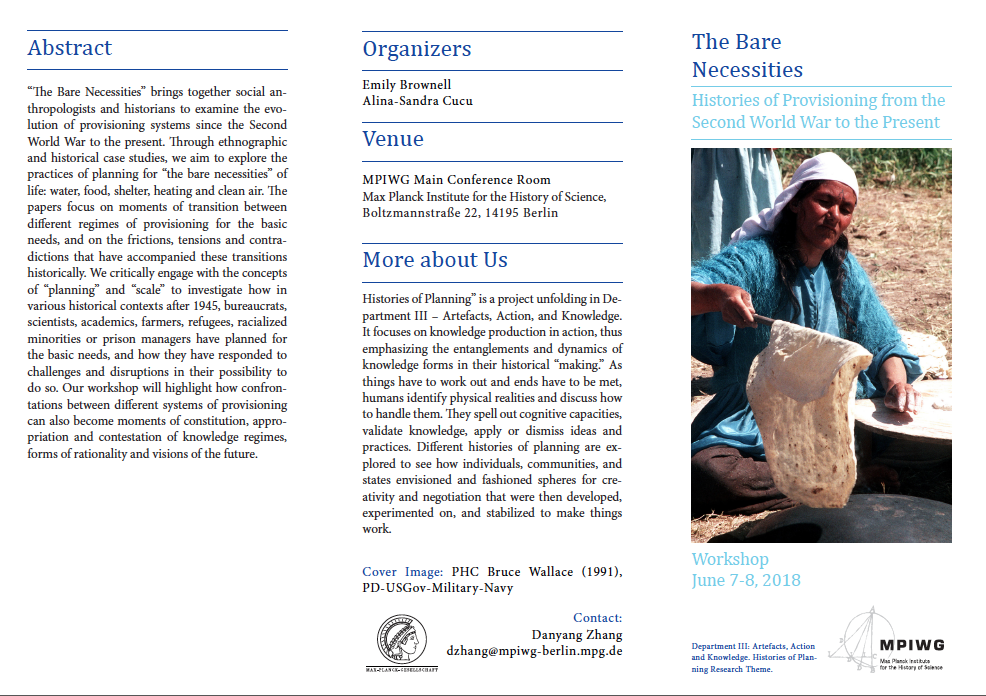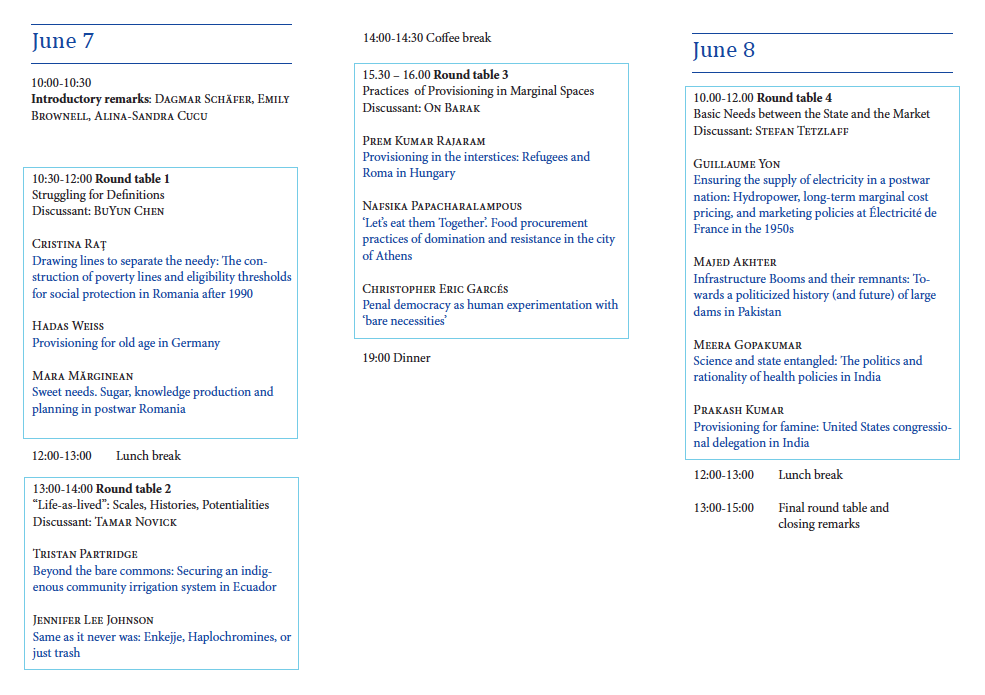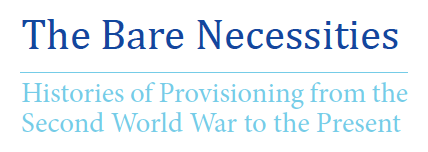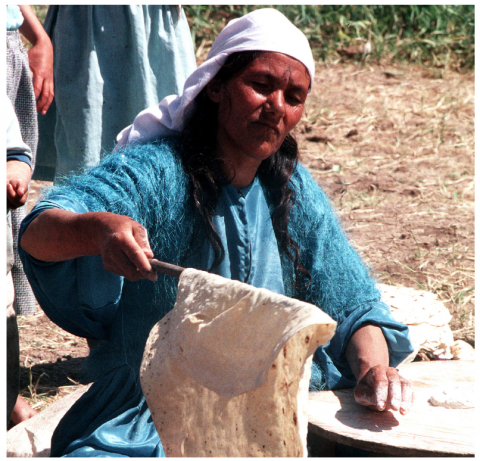Jun 7-8, 2018
The Bare Necessities: Histories of Provisioning from the Second World War to the Present
- 00:00
- Workshop
- Dept. III
“The Bare Necessities” brings together social anthropologists and historians to examine the evolution of provisioning systems since the Second World War to the present. Through ethnographic and historical case studies, we aim to explore the practices of planning for “the bare necessities” of life: water, food, shelter, heating and clean air. The papers focus on moments of transition between different regimes of provisioning for the basic needs, and on the frictions, tensions and contradictions that have accompanied these transitions historically. We critically engage with the concepts of “planning” and “scale” to investigate how in various historical contexts after 1945, bureaucrats, scientists, academics, farmers, refugees, racialized minorities or prison managers have planned for the basic needs, and how they have responded to challenges and disruptions in their possibility to do so. Our workshop will highlight how confrontations between different systems of provisioning can also become moments of constitution, appropriation and contestation of knowledge regimes, forms of rationality and visions of the future.
Program
Thursday June 7
10:00–10:30: Introductory remarks (Dagmar Schäfer, Emily Brownell, Alina-Sandra Cucu)
10:30–12:00: Roundtable 1—Struggling for Definitions
- Cristina Raț, “Drawing Lines to Separate the Needy: The Construction of Poverty Lines and Eligibility Thresholds for Social Protection in Romania after 1990”
- Hadas Weiss, “Provisioning for Old Age in Germany”
- Mara Mărginean, “Sweet Needs. Sugar, Knowledge Production and Planning in Postwar Romania”
12:00–1:00: Lunch Break
1:30–2:30: Roundtable 2—“Life-as-lived”: Scales, Histories, Potentialities
- Tristan Partridge, "Beyond the Bare Commons: Securing an Indigenous Community Irrigation System in Ecuador
- Jennifer Lee Johnson, "Same as It Never Was: Enkejje, Haplochromines, or Just Trash"
2:30–3:00: Coffee Break
3:00–4:30: Roundtable 3—Practices of Provisioning in Marginal Spaces
- Prem Kumar Rajaram, "Provisioning in the Interstices: Refugees and Roma in Hungary"
- Nafsika Papacharalampous, "‘Let’s Eat Them Together.’ Food Procurement Practices of Somination and Resistance in the City of Athens"
- Christopher Eric Garcés, "Penal Democracy as Human Experimentation with ‘Bare Necessities’"
Friday June 8
10:00–12:00: Roundtable 4—Basic Needs between the State and the Market
- Guillaume Yon, "Ensuring the Supply of Electricity in a Postwar Nation: Hydropower, Long-term Marginal Cost Pricing, and Marketing Policies at Électricité de France in the 1950s"
- Majed Akhter, "Infrastructure Booms and their Remnants: Towards a Politicized History (and Future) of Large Dams in Pakistan"
- Meera Gopakumar, "Science and State Entangled: The Politics and Rationality of Health Policies in India"
- Prakash Kumar, "Provisioning for Famine: United States Congressional Delegation in India"
12:00–1:00: Lunch
1:30–3:30: Final Roundtable and Closing Remarks
Contact and Registration
For further information contact Danyang Zhang.
Program





Call for Papers
“The Bare Necessities: Histories of Provisioning from the Second World War to the Present” brings together a global set of case studies for a two-day workshop. By convening a diverse group of scholars, we aim to explore both historically and ethnographically the practices of planning for “the bare necessities” of life: water, food, shelter, heating and clean air. We invite papers that explore the moments of transition between different regimes of provisioning for basic needs and the frictions, tensions, and contradictions that have accompanied these transitions historically. This workshop will highlight how these confrontations between different systems of provisioning are also moments of constitution, appropriation, and contestation of knowledge regimes, forms of rationality and visions of the future.
We invite contributions that critically engage with the concepts of “planning” and “scale” to investigate recent histories of provisioning, with a focus on how they impacted actors’ ways of seeing, knowing, and doing. We aim to understand how in various historical contexts after 1945, bureaucrats, scientists, academics, farmers, factory workers, and precarious categories of the population have shaped systems of provisioning through diverse forms of planning, and what happened when they were confronted with radical changes in these systems. This bottom-up, local level perspective, even for cases when specific notions of “basic needs” are part and parcel of the unfolding on the ground of grand projects.
We welcome historical and ethnographic contributions exploring a range of mundane practices like urban residents taking up farming to address food shortages, denizens storing water when in short supply, marginalized communities recapturing waste flows for re-use, prison managers calculating food ratios, or scientists devising local fuel alternatives for cooking and heating. What kind of struggles emerge around defining what basic needs are? What politics of calculation and mechanisms of knowledge production have various actors employed to arrive at these definitions? How have natural disasters, economic crises or political instability rearticulated systems of provisioning and the knowledge regimes that support them? Papers may also consider what techno-scientific imaginaries are mobilized around the resources, infrastructures, and practices required to sustain the provisioning of basic needs.
Paper proposals—including a title, abstract (500 words max.), and a short CV (one page)—may be submitted via the online submission portal by 28 February 2018. Limited funding is available. Accepted contributions will be notified by mid-March 2018. Please direct research related inquiries to Alina-Sandra Cucu, cucualinasandra@gmail.com.
Keywords: Provisioning, Planning, Rationality, Knowledge Production, Basic Needs
